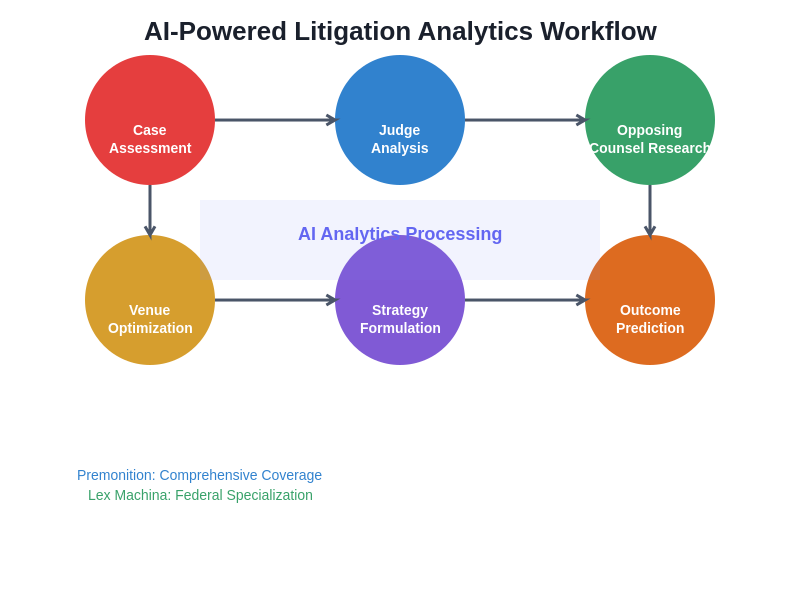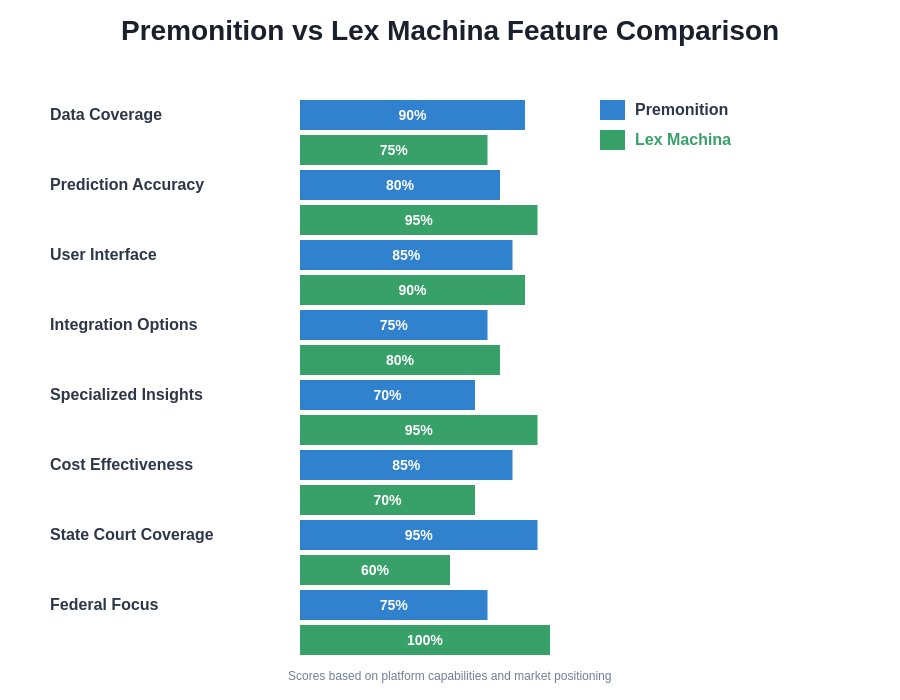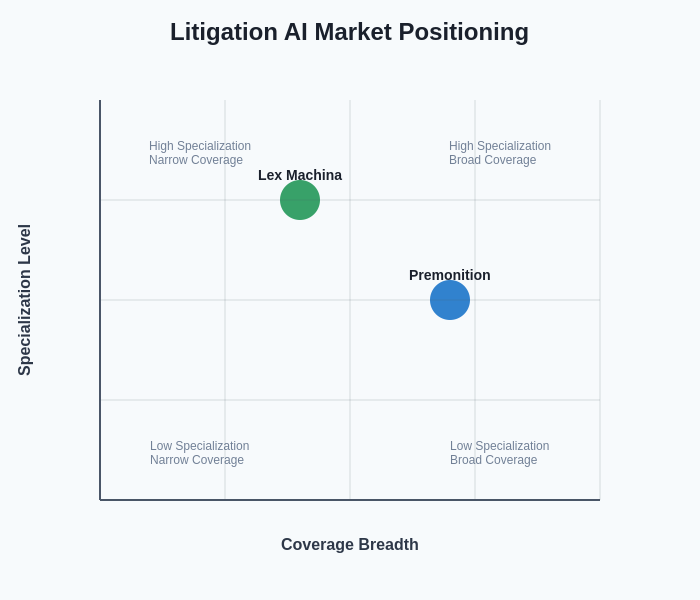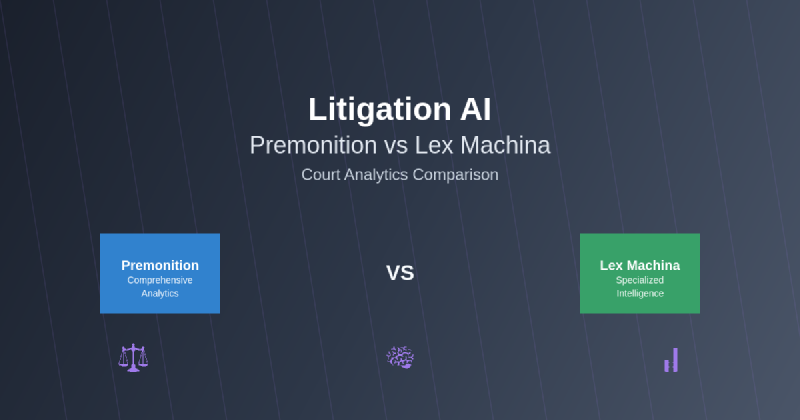The legal industry stands at the precipice of a technological revolution, where artificial intelligence has emerged as a transformative force reshaping how attorneys approach litigation strategy, case preparation, and judicial decision-making. At the forefront of this evolution are sophisticated court analytics platforms that harness the power of machine learning and big data to provide unprecedented insights into judicial behavior, opposing counsel performance, and case outcome predictions. Among the most prominent players in this space, Premonition and Lex Machina have established themselves as industry leaders, each offering unique approaches to litigation intelligence that are fundamentally altering how legal professionals navigate the complexities of modern court systems.
Explore the latest AI innovations in legal technology to understand how artificial intelligence is revolutionizing traditional legal practices and creating new opportunities for strategic advantage in litigation. The integration of AI-powered analytics into legal workflows represents more than just technological advancement; it signifies a fundamental shift toward data-driven decision-making in an industry historically reliant on intuition, experience, and anecdotal evidence.
The Evolution of Legal Analytics
The transformation of legal practice through artificial intelligence reflects a broader trend toward digitization and data-driven decision-making across professional services industries. Traditional legal research and case preparation methods, while time-tested, often relied on limited datasets, subjective interpretations, and historical precedents that may not accurately reflect current judicial trends or emerging legal patterns. The emergence of comprehensive court analytics platforms has addressed these limitations by aggregating vast amounts of judicial data, court records, and case outcomes to provide actionable insights that inform strategic decision-making at every stage of the litigation process.
Modern litigation AI platforms have evolved far beyond simple case law research tools to become comprehensive intelligence systems capable of analyzing judicial behavior patterns, predicting case outcomes, identifying optimal venues for specific types of litigation, and evaluating the historical performance of opposing counsel and judges. This evolution has created unprecedented opportunities for legal professionals to optimize their strategies based on empirical evidence rather than assumptions, ultimately leading to more favorable outcomes for clients while reducing the inherent uncertainties associated with litigation.
Premonition: The Comprehensive Court Intelligence Platform
Premonition has distinguished itself in the litigation AI landscape through its comprehensive approach to court analytics, offering what the company describes as the world’s largest litigation database combined with sophisticated artificial intelligence algorithms designed to predict case outcomes and optimize legal strategies. The platform’s core strength lies in its ability to aggregate and analyze millions of court records, creating detailed profiles of judges, attorneys, and law firms based on their historical performance across various types of cases and jurisdictions.
The platform’s analytical capabilities extend beyond simple win-loss statistics to provide nuanced insights into judicial tendencies, including preferred legal arguments, typical case durations, settlement patterns, and verdict amounts. This granular level of analysis enables attorneys to tailor their strategies to specific judges and opposing counsel, potentially increasing their chances of favorable outcomes while identifying potential challenges early in the litigation process. Premonition’s approach to data visualization and reporting provides users with intuitive dashboards that transform complex analytical insights into actionable intelligence that can be easily integrated into case preparation workflows.

The systematic approach to litigation analytics demonstrates how AI-powered platforms transform traditional legal research into a comprehensive intelligence-gathering process that encompasses every critical aspect of case strategy and preparation.
Discover advanced AI capabilities with Claude for comprehensive analysis and strategic planning in complex legal scenarios. The sophisticated reasoning capabilities of modern AI systems complement traditional legal expertise by providing analytical frameworks that can process vast amounts of information and identify patterns that might not be immediately apparent to human analysts.
Lex Machina: Pioneering Legal Analytics Excellence
Lex Machina has established itself as a premier legal analytics platform by focusing on delivering precise, actionable intelligence derived from comprehensive analysis of federal court data and patent litigation records. The platform’s approach emphasizes depth and accuracy over breadth, providing detailed insights into specific practice areas while maintaining the highest standards of data quality and analytical rigor. Lex Machina’s strength lies in its ability to transform raw court data into strategic intelligence that enables attorneys to make informed decisions about case strategy, venue selection, and resource allocation.
The platform’s analytical framework encompasses detailed tracking of case timelines, motion practice success rates, damages awards, and settlement patterns, providing users with comprehensive insights into how similar cases have been resolved in the past. This historical perspective, combined with sophisticated predictive modeling, enables attorneys to develop more effective strategies while setting realistic expectations for clients regarding potential outcomes and case duration. Lex Machina’s commitment to data accuracy and analytical precision has made it a trusted resource for major law firms and corporate legal departments seeking reliable intelligence for high-stakes litigation.
Comparative Analysis: Platform Capabilities
The fundamental differences between Premonition and Lex Machina extend beyond their respective approaches to data collection and analysis to encompass their target markets, feature sets, and strategic philosophies regarding litigation intelligence. Premonition positions itself as a comprehensive court intelligence platform that provides broad coverage across multiple jurisdictions and practice areas, while Lex Machina focuses on delivering deep, specialized insights within specific legal domains where accuracy and precision are paramount.
Premonition’s broader approach enables users to access intelligence across a wider range of case types and jurisdictions, making it particularly valuable for firms handling diverse litigation portfolios or seeking to expand into new practice areas. The platform’s emphasis on comprehensive coverage and predictive analytics appeals to organizations that prioritize strategic flexibility and broad-based intelligence gathering. In contrast, Lex Machina’s specialized focus on federal litigation and patent disputes provides users with exceptionally detailed insights within these specific domains, making it particularly valuable for firms with concentrated practice areas that require deep analytical expertise.

The comparative analysis reveals distinct strengths and positioning strategies between these leading litigation AI platforms, with each excelling in different areas that align with their strategic focus and target market requirements.
Data Sources and Analytical Methodologies
The effectiveness of any litigation AI platform fundamentally depends on the quality, comprehensiveness, and accuracy of its underlying data sources, as well as the sophistication of its analytical methodologies for extracting meaningful insights from vast amounts of judicial information. Both Premonition and Lex Machina have invested significantly in developing robust data collection and processing capabilities, though their approaches differ in terms of scope, methodology, and analytical focus.
Premonition’s data collection strategy encompasses court records from multiple jurisdictions, creating a comprehensive database that includes state and federal court proceedings across various practice areas. The platform’s analytical methodology employs machine learning algorithms designed to identify patterns and correlations that may not be immediately apparent through traditional legal research methods. This comprehensive approach enables the platform to provide insights across a broad spectrum of litigation types while maintaining statistical validity through large sample sizes and diverse data sources.
Lex Machina’s approach to data collection emphasizes depth and accuracy within its core focus areas, particularly federal court proceedings and patent litigation. The platform’s methodology involves detailed manual review and verification of court records to ensure data accuracy and completeness, combined with sophisticated analytical models that account for the unique characteristics of federal litigation. This meticulous approach to data quality has enabled Lex Machina to provide highly reliable insights within its specialized domains, though it necessarily limits the platform’s breadth of coverage compared to more comprehensive approaches.
Enhance your research capabilities with Perplexity for comprehensive information gathering and analysis that complements specialized legal analytics platforms. The integration of multiple AI-powered research tools creates a comprehensive intelligence ecosystem that supports informed decision-making across all aspects of litigation strategy and case preparation.
User Experience and Interface Design
The effectiveness of litigation AI platforms extends beyond their analytical capabilities to encompass the user experience and interface design that determines how effectively legal professionals can access, interpret, and act upon the insights provided by these sophisticated systems. Both Premonition and Lex Machina have invested considerable resources in developing user interfaces that balance analytical depth with practical usability, though their approaches reflect their different strategic priorities and target user bases.
Premonition’s interface design emphasizes accessibility and comprehensive data presentation, providing users with multiple pathways to explore the platform’s extensive database and analytical capabilities. The platform’s dashboard approach enables users to quickly access key insights while providing drill-down capabilities for more detailed analysis when required. This design philosophy reflects Premonition’s goal of serving a broad user base with varying levels of technical expertise and analytical sophistication, making advanced litigation intelligence accessible to attorneys across different practice areas and experience levels.
Lex Machina’s interface design prioritizes precision and detailed analysis within its core competency areas, providing users with sophisticated tools for exploring complex relationships and patterns within federal litigation data. The platform’s approach to data visualization emphasizes accuracy and analytical depth, enabling experienced users to conduct detailed investigations while maintaining clarity and usability for less technical users. This design philosophy aligns with Lex Machina’s focus on serving specialized users who require detailed analytical capabilities within specific practice domains.
Integration Capabilities and Workflow Enhancement
Modern legal practice increasingly depends on integrated technology ecosystems that enable seamless information flow between different platforms and applications used throughout the litigation process. Both Premonition and Lex Machina have recognized the importance of integration capabilities in delivering value to their users, though their approaches to workflow enhancement reflect their different strategic priorities and technical architectures.
Premonition’s approach to integration emphasizes compatibility with existing legal technology stacks, providing APIs and data export capabilities that enable users to incorporate litigation intelligence into their established workflows and case management systems. The platform’s flexible architecture supports various integration scenarios, from simple data exports to sophisticated API integrations that enable real-time access to analytical insights within other applications. This approach reflects Premonition’s goal of serving as a central intelligence hub that enhances rather than replaces existing legal technology investments.
Lex Machina’s integration strategy focuses on providing reliable, accurate data feeds that can be incorporated into specialized analytical workflows and decision-making processes. The platform’s emphasis on data quality and analytical precision extends to its integration capabilities, ensuring that users can confidently incorporate Lex Machina insights into their strategic planning and case preparation activities. This approach appeals to organizations that prioritize accuracy and reliability over broad integration capabilities, particularly in high-stakes litigation scenarios where data quality is paramount.
Cost Considerations and Value Proposition
The financial considerations associated with litigation AI platforms extend beyond simple subscription costs to encompass the broader value proposition these tools provide in terms of improved case outcomes, enhanced efficiency, and reduced risk exposure. Both Premonition and Lex Machina offer different pricing models and value propositions that reflect their strategic positioning and target market focus, requiring potential users to carefully evaluate the alignment between their specific needs and each platform’s capabilities.
Premonition’s pricing strategy reflects its comprehensive approach to litigation intelligence, offering various subscription tiers that provide different levels of access to the platform’s extensive database and analytical capabilities. The platform’s value proposition emphasizes broad coverage and predictive analytics that can benefit legal professionals across multiple practice areas and case types. This approach may provide significant value for firms handling diverse litigation portfolios or seeking to expand their analytical capabilities across different domains, though organizations with specialized needs may find some features less relevant to their specific requirements.
Lex Machina’s pricing model reflects its focus on specialized, high-quality analytics within specific legal domains, with subscription costs that align with the platform’s premium positioning and analytical sophistication. The platform’s value proposition emphasizes accuracy, reliability, and depth of analysis within its core competency areas, appealing to organizations that prioritize analytical precision over broad coverage. This approach may provide exceptional value for firms specializing in federal litigation or patent disputes, while organizations requiring broader analytical coverage may need to supplement Lex Machina with additional resources.
Implementation Considerations and Best Practices
Successful implementation of litigation AI platforms requires careful planning, user training, and integration with existing workflows to maximize the value of these sophisticated analytical tools. Both Premonition and Lex Machina provide implementation support and training resources, though the specific requirements and best practices vary depending on the platform chosen and the organization’s existing technology infrastructure and analytical capabilities.
Organizations considering Premonition implementation should focus on developing comprehensive training programs that enable users to effectively navigate the platform’s extensive feature set and interpret analytical insights within the context of their specific practice areas. The platform’s broad coverage and comprehensive analytical capabilities require users to develop sophisticated analytical skills to extract maximum value from available data and insights. Implementation success often depends on establishing clear workflows that integrate Premonition insights into existing case preparation and strategic planning processes.

The strategic positioning of litigation AI platforms reflects their distinct approaches to balancing comprehensive coverage with specialized expertise, creating different value propositions that serve various segments of the legal market.
Lex Machina implementation typically requires focused training on the platform’s specialized analytical capabilities and data interpretation methodologies, with particular emphasis on understanding the nuances of federal litigation analytics and patent-specific insights. The platform’s emphasis on analytical precision and data quality requires users to develop sophisticated understanding of statistical analysis and data interpretation to fully leverage available capabilities. Organizations should focus on establishing rigorous data validation and analytical review processes to ensure that insights are properly interpreted and applied within appropriate contexts.
Future Developments and Industry Trends
The litigation AI landscape continues to evolve rapidly, with both Premonition and Lex Machina investing in advanced analytical capabilities, expanded data sources, and enhanced integration features that will shape the future of legal analytics and strategic decision-making. Understanding these developmental trajectories and industry trends is crucial for organizations making long-term technology investments and strategic planning decisions.
Emerging trends in litigation AI include expanded coverage of state court systems, integration of alternative dispute resolution data, enhanced predictive modeling capabilities, and improved natural language processing for document analysis and case preparation. Both platforms are likely to continue expanding their analytical capabilities while maintaining their distinct strategic positions within the market, with Premonition potentially broadening its coverage and analytical scope while Lex Machina deepens its expertise within specialized domains.
The integration of artificial intelligence and machine learning technologies into legal practice represents a fundamental shift toward data-driven decision-making that will continue to accelerate as these platforms mature and expand their capabilities. Legal professionals who effectively integrate these tools into their practice will likely gain significant competitive advantages, while those who resist adoption may find themselves at increasing disadvantage in an increasingly analytical and data-driven legal environment.
Strategic Decision-Making Framework
Choosing between Premonition and Lex Machina requires careful consideration of organizational needs, practice area focus, analytical sophistication requirements, and long-term strategic objectives. Legal organizations should develop comprehensive evaluation frameworks that account for both immediate needs and future growth plans when selecting litigation AI platforms.
Organizations with diverse litigation portfolios and broad analytical requirements may find Premonition’s comprehensive approach more aligned with their needs, particularly if they value predictive analytics and broad jurisdictional coverage over specialized depth within specific practice areas. The platform’s extensive database and comprehensive analytical capabilities provide significant value for firms seeking to enhance their strategic capabilities across multiple domains while maintaining cost-effectiveness through consolidated platform usage.
Conversely, organizations specializing in federal litigation, patent disputes, or other areas where Lex Machina provides deep analytical coverage may find superior value in the platform’s precision and analytical sophistication within these specialized domains. The platform’s emphasis on data quality and analytical accuracy may justify higher costs for organizations where analytical precision directly impacts high-stakes litigation outcomes and strategic decision-making.
The evolution of litigation AI platforms like Premonition and Lex Machina represents a paradigm shift in legal practice that extends far beyond simple technological adoption to encompass fundamental changes in how attorneys approach strategic decision-making, case preparation, and client counseling. These sophisticated analytical tools provide unprecedented insights into judicial behavior, case outcome patterns, and strategic optimization opportunities that can significantly impact litigation success and client satisfaction.
The choice between these platforms ultimately depends on organizational priorities, practice area focus, analytical requirements, and strategic objectives. Both Premonition and Lex Machina offer compelling value propositions within their respective domains, and the optimal choice varies depending on specific use cases and organizational contexts. Legal professionals who successfully integrate these tools into their practice while maintaining the human elements of legal judgment, creativity, and client relationship management will likely achieve the greatest success in an increasingly data-driven legal environment.
Disclaimer
This article is for informational purposes only and does not constitute professional legal or technology advice. The analysis provided is based on publicly available information about litigation AI platforms and industry trends. Legal professionals should conduct thorough due diligence and consider their specific requirements when evaluating and implementing litigation analytics platforms. The effectiveness and value of these platforms may vary significantly depending on specific use cases, organizational context, and implementation approaches.
